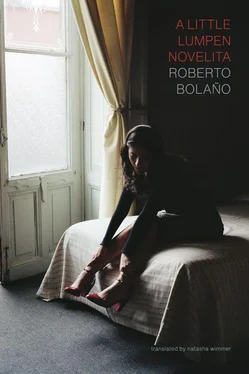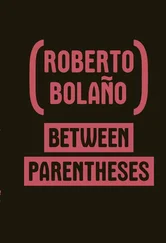But the reality is that I hardly ever slept at his house, and also that after dreaming for a while about our life together I would start to wonder where the hell that safe could be.
Late at night, when I got home and my brother and his friends were half-awake, we argued about it. The Bolognan was getting impatient, he said we’d didn’t have all the time in the world, and sometimes he talked about breaking in, armed with a knife or whatever, but when he said this he trembled, he and the Libyan and my brother, the very idea made them tremble, and it wasn’t hard for me to steer them back to the original plan.
Other times we talked about Maciste’s story, about the movies he’d made that had been such hits. For weeks my brother even looked around the neighborhood video stores and then downtown for the movie called Maciste vs. the Tartars , which according to the Bolognan was the best, but he never found it.
I was glad he couldn’t find it because I didn’t like the idea of seeing Maciste as a young man, when he still had his sight and his hair and a perfect body. I didn’t want to see that because I knew what was to come, twenty years later. But once I dreamed about the movie. First, two armies clashed on a dry plain. Then Maciste fought twenty warriors inside a palace and defeated them all. At some point a woman appeared in a tunic of gauzy silk and kissed Maciste. The two of them stood on the edge of a cliff. An abyss yawned at their feet and wisps of smoke rose on the horizon. Then I saw Maciste sleeping in a room with marble walls and a marble floor. And in the dream I thought: this is a movie, he’s not really sleeping, he’s just pretending to sleep, and in fact he’s awake, and only then did I realize that Maciste, making the movie, was in the present, and I, watching the movie or dreaming that I was watching it, was in the future, Maciste’s future, or, in other words, nothingness. Then I woke up.
Anyway, I preferred to see him the way he really was when I went to visit him at his house, twice a week.
At the salon things weren’t good. Though in some ways they were better than they had been. I was usually exhausted when I got there and sometimes I stumbled through the day like a sleepwalker. Once the boss, who was an understanding woman, pulled me into the bathroom and pushed up my sleeves, looking for needle tracks on my arms.
“I’m not doing drugs,” I said.
“What’s wrong with you, Bianca? You’re looking worse and worse.”
“I’m sleeping badly,” I said.
It was true. Sometimes I’d go for weeks getting three or four hours of sleep a night.
Once I was tempted to ask Maciste how he lost his sight. The Bolognan and the Libyan had warned me never to raise the subject. According to them, the last person to show any curiosity about Maciste’s blindness had ended up with a couple of broken ribs. It wasn’t their warning that gave me pause. I knew Maciste would never lift a hand against me. But there was something that stopped me, something else.
Sometimes I thought it was a good thing that he had gone blind, because that way he would never see me, never see my face, never see the look on my face when I was with him, which wasn’t the look of a prostitute or a thief or a spy, but an expectant look, the look of someone hoping for anything and everything, from a kind word to a life-changing declaration.
There weren’t many kind words, because Maciste didn’t talk much, but there were kind gestures. And there were no life-changing declarations, or at least none I recognized at the time, though since then I’ve come to remember each of Maciste’s words as a key or a dark bridge that surely could have led me elsewhere, as if he were a fortune-telling machine designed exclusively for me, which I know isn’t true, though sometimes I like to think so, not often, because I don’t lie to myself the way I used to, but every once in a while.
The rest of the time I spent looking for the safe.
It was a safe that began to seem more and more like an invention of my brother’s friends, a safe that existed only in their criminal minds and in their overwrought imaginations — because back then, even if I had a criminal mind too, that didn’t mean I let my imagination run wild after something nonexistent.
I wasn’t overwrought. In fact, what I felt was a strange stillness, as if before arriving at Maciste’s big old house on Via Germanico I had been on the run for months and even years, but from the moment I stepped into his house, from the moment I saw him naked and hulking and white, like a broken refrigerator, everything stopped (or I stopped) and now things were happening at a different speed, an imperceptible speed that was the same as stillness.
Sometimes I looked at them, at my brother and his friends, I looked into their innocent eyes and I was tempted to say:
“The safe exists in only one place — in your fucked-up heads.”
But I think I was afraid of convincing them. I was afraid that they would believe me and then there wouldn’t be any reason, money aside, for my weekly visit to Maciste’s house. Not that anyone would stop me. And the extra money came in handy. But I knew that to keep visiting him with no ulterior motive would destroy me.
Maciste’s eyes — unlike my brother’s eyes and his friends’ eyes — weren’t innocent. He almost always wore sunglasses. But sometimes he would take them off and look at me or pretend to look at me. Then I would shiver and close my eyes and hug him or try to hug him, which was always hard considering his size. One day the Bolognan said to me:
“That bastard is messing with your head. Find the safe and let’s get this over with.”
He wasn’t as dumb as he seemed. And in a way, he was right. The problem was that I couldn’t listen to reason anymore. But he was right.
And another time he said:
“Think of the future, think of all the things we have to look forward to in the future.”
But there he was wrong. Deep down I was always thinking about the future. I thought about it so much that the present had become part of the future, the strangest part. To visit Maciste was to think about the future. To sweat, to venture into pitch-black rooms, was to think about the future, a future that resembled a room in Maciste’s house, but in sharper focus, the furniture covered in old sheets and blankets, as if the owners of the house (a house in the future) had gone away on a trip and didn’t want dust to collect on their things. And that was my future and that was how I thought about it, if you can call it thinking (and if you can call it a future).
But most of the time I preferred not to think about anything. I let my mind wander and I spent a long time at one of the windows that overlooked the back garden, naked, my skin still lubricated, watching the night and the stars, the walls of the neighboring houses.
Sometimes I heard a strange sound that split the darkness like a ray of chalk, and Maciste said it was the cry of a hawk that lived in an abandoned house nearby, though I had never heard of a hawk living in a big city, but these things happen in Rome, strange things that were at the time beyond my comprehension and that I easily accepted in a way that today surprises and even repels me: with a shuddering ease, as if leading a life of crime meant always quivering inside, as if leading a life of crime brought with it mingled sensations of immense guilt and pleasure that made me laugh, for example, for no apparent reason at the least appropriate moments, or that plunged me briefly into sadness, a portable sadness that lasted no longer than five minutes and luckily was easy to hide.
At home, meanwhile, everything was the same.
Sometimes, on the nights that I didn’t visit Maciste, I left the door open for one of my brothers’ friends, with the lights off and my eyes closed, since under no circumstances did I want to know which one of them it was, and I made love mechanically, and sometimes I came many times, which caused me to erupt in fierce, unexpected bursts of rage and to cry bitterly.
Читать дальше












